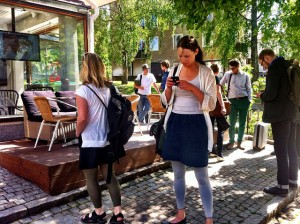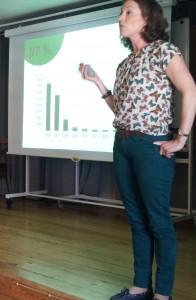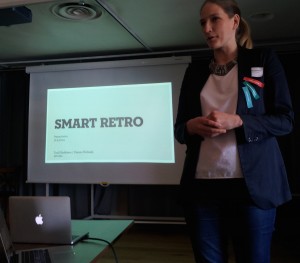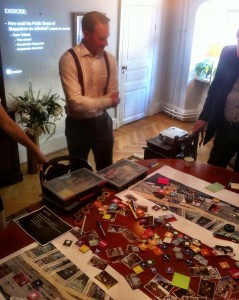Smart Retro, a smart city project by Demos Helsinki and its distinguished partners, was kicked off in a spirit of enthusiastic co-operation. The high ambition of the Smart Retro is to turn the massive potential of the 60’s and 70’s buildings stock into a business model innovation that combines energy retrofitting…
Smart Retro, a smart city project by Demos Helsinki and its distinguished partners, was kicked off in a spirit of enthusiastic co-operation. The high ambition of the Smart Retro is to turn the massive potential of the 60’s and 70’s buildings stock into a business model innovation that combines energy retrofitting of buildings and smart service development.
When bread runs out in a terrace of a Peruvian restaurant, a waitress walks down the street and soon returns from a local bakery with a full tray of freshly baked loaf. It’s a sunny day in Hökarängen, a 1950s built Stockholm neighborhood to where restaurants, a jeweller’s store, a repair shop for bikes among other small local businesses have been reactivated.
 “Some years ago, most of the shops in Hökarängen were empty and out of business”, described Emma Henriksson from Stockholmshem, when project partners visited the area. During Stockholmshem’s revitalisation project, the local services have been reactivated while the community has also become more resource effective.
“Some years ago, most of the shops in Hökarängen were empty and out of business”, described Emma Henriksson from Stockholmshem, when project partners visited the area. During Stockholmshem’s revitalisation project, the local services have been reactivated while the community has also become more resource effective.
This is not the case in most of the Nordic suburbs. Especially in the areas built in the mid 20th-century, many of the buildings are in a need of renovation and the availability of local retail and services is declining. Renovation projects are becoming more and more common, but in the light of present social and ecological sustainability challenges there is an urgent need to thoroughly reconsider them. Besides improving the technical performance of the buildings, these projects also hold a great potential to address sustainable lifestyles changes and revitalization of local retail and service economies.

“Not all the office work is anymore done at the office. Offices have an average occupancy rate of 30 percent.” – Anna Denell, Vasakronan.
Demos Helsinki has launched a project called Smart Retro to create desired methods for renovating urban areas to become environmentally and economically sustainable. In doing so, a hand-picked group of Smart Retro thought leaders from the fields of technology, construction, property, urban development, architecture, public sector and science and a number of very promising startups working on Smart Retro solutions were invited to share thoughts and kick off the collaboration.
In May 2014 Demos Helsinki invited these experts to Stockholm for the first Smart Retro meetup.
”To turn building into an office, you need transportation, cleaning and heating, among many other services. If we want to be sustainable, we need to think about both walls and services.”
This was Anna Denell, Sustainability Director of one of the Europe’s largest real-estate companies Vasakronan. As Anna and several participants from the fields of real estate and architecture pointed out in the meet up, using sustainable building materials is not sufficient for creating sustainable urban areas. Smart Retro aims at creating a comprehensive model for sustainable planning, in which the whole area – including users’ needs for mobility, goods and services – will be considered.

“In the light of present social and ecological challenges there is an urgent need of new sustainable service models in built environment” commented Tuuli Kaskinen of Demos Helsinki the need for Smart Retro.
Smart makes life easier
Individual decisions have a great impact on an area’s resource consumption. Electricity and hot water usage, waste recycling, food consumption and personal mobility, to mention a few, are decisions that concern all of us. ”Smart is something that makes life easier”, defined professor Jarmo Suominen from Aalto, willing to point out that a service alternative to a physical product can, and should, be sustainable and beneficial at the same time. That’s how an environment turns into attractive one. ”The key is not to see people as inhabitants or customers – but as participants in the city”, said Suominen.
Hökarängen proves that successful service models already exist. But that is just a start. Digitalization is at the moment disrupting service and retail industries everywhere. Fourdeg’s water-radiator heating systems and Bundles’ intensive smart household appliances were two out of plenty startups from Peloton Club and Rockstart, incubators for “smartup” companies, seen in the Smart Retro meet up. In the coming years smartups are likely to provide a novel layer of services that make life in cities much easier and more sustainable than before.
The Smart Retro meetup proved that the scene smart retro scene is already out there. Over the span of the next 16 months the Smart Retro partners will spend their time developing new service models to built environment at Innovation Camps with other experts, entrepreneurs, residents and various other stakeholders in Lahti, Stockholm and Oslo. “We encourage promising startups developing smart sustainable services to apply for the camp”, says project’s manager Outi Kuittinen.
Smart Retro Partners
City of Lahti, Stockholmshem, Stockholm Business Region Development, City of Oslo Futurebuilt, YIT Corporation, Grandlund ltd, Citycon, Aspelin Ramm, Citymarket Paavola, Kesko, KTH Royal Institute of Technology and Oslo National Academy of the Arts.
Interested in Smart Retro?
Contact
Outi Kuittinen @demoshelsinki.fi +358 50 326 5582
Roope Mokka @demoshelsinki.fi +46 70 2500 364


Smart Retro: A novel way of developing cities with digital services
Project
September 28, 2017